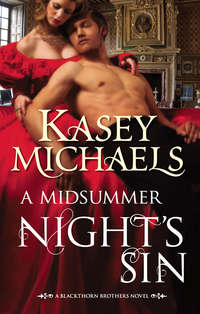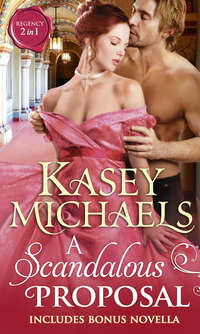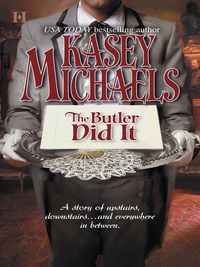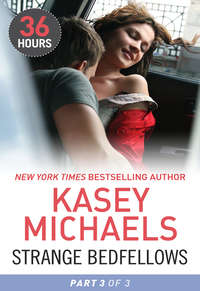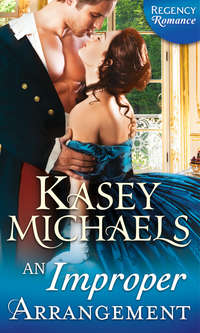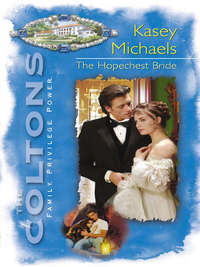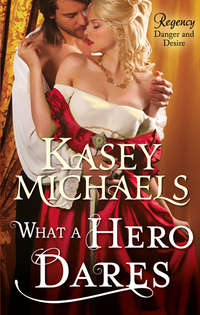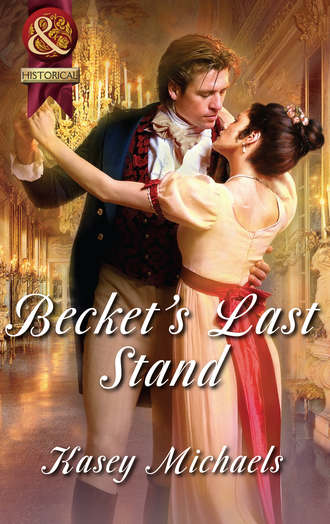
Полная версия
Becket's Last Stand
He’d had the desk shipped to his new mansion in Portland Square, along with other treasures he’d collected over the past two decades, leaving behind in Paris the few pieces “collected” during his privateering days he had deemed impressive enough to keep. He hadn’t been much interested in collecting chairs, or rugs, or other furnishings all those years ago, the way Geoff had been. An oversight, one he regretted now, but there was nothing that couldn’t be corrected with ample infusions of money, of which he had more than a sufficient amount.
Still, the Emperor Napoleon’s desk? That was rather a coup. Perhaps he should have a brass plaque attached to it, so that all could know of his prize. Ah, but that would be the old Edmund Beales, and spoke too much of flash and dash. Today he was a solid citizen, sober and earnest and… “Oh, for the love of heaven, gentlemen, sit down. I’m not going to bite.”
Sir Horatio was the first to speak, but not until he had squirmed uncomfortably in his chair, as if doing his best to avoid a tack someone had placed there to poke at his enormous backside. “We, um, we didn’t know you’d be returning, Mr. Beatty. Your departure two years ago—is it two years now?— well, it was rather precipitous, wasn’t it? And…and so soon after poor Rowley disappeared. His house burning down like that, his dear wife fleeing to the country, seemingly to bury herself there, as yet to return to society.”
“This cheers you?”
“Rowley disappearing?” Mr. Roberts asked rather incredulously, and then winced, as if sorry he had spoken, drawn attention to himself. “Not that we don’t know where he went to, not with Horatio here working at the Admiralty. Died just a few weeks ago, you know. Hanged himself in his cell, poor bastard.”
“Hell of an end for a man with so much ambition,” Sir Horatio said, touching his hand to his neck cloth.
Beales nodded, assuming a woebegone expression. “Yes, yes, shall we all drink a toast to the memory of the dear Earl of Chelfham, who destroyed a most profitable enterprise for us all with his stupidity and greed. Who is to say if the ending of the war wouldn’t have been different if the Red Men Gang had been able to keep up its guinea runs these past years. Not being able to pay his soldiers was not the greatest of our friend Bonaparte’s problems, but it certainly had an impact. Although we’ve all learned a valuable lesson, haven’t we, gentlemen?”
“Not to back the wrong horse,” Mr. Roberts said, and then once again bit his lips together, as if regretting his words.
“Yes, that, as well,” Beales agreed, smiling thinly. “But I was referring to Lord Chelfham’s belief that he could hoodwink me, try to steal from me. From me, gentlemen—can you imagine? I only regret being unable to get to him sooner, ease the pain of his incarceration and his guilt over his betrayal of the rest of us. But when at last the opportunity presented itself, I made certain it was a stout rope. Do you think he was grateful for the time, effort, and considerable expense I incurred having someone insinuated into his lordship’s plush prison? I’ve wondered about that, or if he still thought his pitiful life worth living. And yet, I feel I owe the man something for the services he did render me in the past, which is why you are here. Gentlemen? Some wine?”
“I’ll get us some,” Mr. Roberts volunteered, jumping up from his chair to play at servant. “Over there, yes?” he asked, pointing to the lavish drinks table set up in one corner of the large study.
“Ah, Francis,” Beales purred, placing a few small dark green leaves between his teeth and cheek. “Still the master of the obvious, I see. None for me, thank you. I long ago found my own way to paradise.”
Beales chewed on the coca leaves, releasing their invigorating, mind-expanding juices as he watched Francis Roberts pull the lead crystal stopper from the decanter and then fill two glasses, spilling only a few drops in his nervousness. Once the gentlemen had been served and Roberts was back in his chair, a careful, two- handed grip on the fragile glass, he said, “And so, delighted as I am to see you both again, I’m afraid this meeting of ours is not purely social. There is—”
“Mr. Beatty?” Sir Horatio cut in, raising his hand like some slow-witted student unable to understand the simplicity of two plus two. “You don’t mean to take up where, well, where we left off when our smuggling enterprise was so sadly compromised? With Bonaparte gone for good now, there really is no reason, unless you wish to begin trading in brandy and silks and such, rather than gold guineas.”
“No, no, never return to the same well once it has gone dry, Sir Horatio,” Beales agreed, inwardly wishing to wring the idiot’s fat neck for daring to interrupt him. Ah, well, he wouldn’t need the man much longer. “I am sufficiently well situated, for the moment, monetarily, and can only hope the same for you both. I do, as I’ve already alluded to, have this one small, niggling problem standing between me and a happy existence here in London.”
Francis Roberts must have seen this as his cue, for he sat forward on his chair, his hands gripping the wooden arm rails. “Whatever you need, Mr. Beatty, sir, consider it already done.”
Fools rush in, Beales thought, blessing the gods for peopling the earth with so very many of them ripe for the picking.
“Why, thank you, Francis. That’s so kind in you. I’m quite touched, truly. Almost as if I don’t hold both the rather large mortgages on your estate. And you, Horatio? Are you likewise amenable?”
“Oh, yes, yes indeed. Anything I can do to be of service, as always.”
Beales watched as the man flushed uncomfortably. No need to mention the sword of Damocles he held over Sir Horatio’s head. After all, whose business was it if a man wished to keep his lover in a picturesque cottage near Bath? Even if that lover of such long- standing is one’s own nephew—a young man also in the employ of the so-discreet Edmund Beales?
Knowledge. Power. Knowledge was power. And Edmund Beales did so appreciate both.
“Very well,” Beales said after the silence in the room had grown, at least for his two visitors, decidedly tense. “First, for reasons my own, I am, for the nonce, no longer Nathanial Beatty. Erase, if you please, that name from your memories. In fact, erase me from your memories. Both for only a small space of time, but until I give you permission, you do not know me, have never met me. Understood?”
Francis Roberts actually began to smile, as if just given a gift from above, but quickly covered his mouth and coughed into his fist. Obviously not quite as stupid as he looked, Beales thought. He might keep him.
“Then what will we call you?”
Beales looked at Sir Horatio from beneath heavy eyelids. Him he most definitely would not keep. The man was a stepping stone into the rarefied society of Mayfair, as were all the others, but his usefulness would end soon.
“You will not call me anything, Horatio, for you will not know me,” Beales explained as he would to a child. “You will see me on the street and nod your head in passing as you would to any gentleman you encounter, but that is all. Are we understanding each other now, or shall I write it down for you, have you memorize it and then recite to me tomorrow, so I can be certain you have taken such complex information into your brainbox, hmm?”
“No, sir,” Sir Horatio said, looking into his empty wineglass as if wishing it full again.
“Very well. Now, if we may proceed with my crisis of conscience?” Beales picked up a piece of paper from his desk, turned it about and slid it across the surface toward Roberts, the smarter of the two men, if it was possible to differentiate between Dumb and Obtuse.
Roberts picked up the paper, read aloud, “‘Geoffrey Baskin, captain, the Black Ghost, now known by the name Becket and residing somewhere in Romney Marsh, most probably near the Channel. Jacko, no surname known, captain, the Silver Ghost, probably also somewhere in Romney Marsh—’”
“Yes, yes, I know what’s written on the page, thank you, Francis,” Beales said, waving away the man’s words. “Now, let me tell you their crimes, shall I? Because these men must be located, gentlemen, and brought to justice for the crimes of piracy and murder against the Crown. Found, tried, convicted and hanged…within the month, if possible. Can you do this?”
“Piracy? Where?” Sir Horatio asked, frowning. “Smuggling, God knows, and even some ship wreckers still operating in Cornwall. But piracy? Not in these waters.”
“Indeed, no. Francis holds the paper containing all of the pertinent information. We’re speaking of a time before the turn of the century, gentlemen, in the waters somewhere off Haiti, and a convoy of several ships from three nations, joined together to protect each other in dangerous waters. The French and Spanish ships are of no account to us, of course, but the English ship that was, sadly, sent to the bottom carried not only property of the Crown and its captain and crew, but also the Sixth Earl of Chelfham—yes, gentlemen, the older brother of our dear departed friend Rowley— along with his lady wife and young daughter. Monstrous, just monstrous, wouldn’t you agree?”
“Rowley’s older brother?” Sir Horatio looked to Francis Roberts. “That’s how Rowley came into his title, remember? His brother was lost at sea? Damn and blast, murdered by pirates? Did you know that?”
Roberts shook his head, his gaze still concentrated on the paper in his shaking hand. “This was all so long ago. There’s…there’s proof?”
“All you might ever need,” Beales said, steepling his fingers in front of his chin. “A letter, dictated on his deathbed by one of Baskin’s outraged crew and witnessed by none other than our mutual friend Rowley himself. In fact, we may also have living evidence, much to my own astonishment, as Rowley tearfully informed my, um, my agent before his untimely suicide, that his brother’s child—the young daughter?—may still survive. My only possible conclusion is that she was either roughly abused by these horrible men at the time of the attack and then murdered, or that she remains a captive of Baskin’s all these years later, possibly living the life of a servant, poor thing. Name of Eleanor, I believe Rowley told my agent. I had dismissed the information at the time, thinking Rowley needlessly sentimental as he looked death in the face, but have since come to believe him most wholeheartedly. If you can locate her, this would help to prove our case against Baskin, yes?”
“A crime against humanity!” Sir Horatio exclaimed, his eyes gone wide. “I assure you, Mr. Beatty—that is, I assure you, sir, that I will bring the full concentration of my post to bear, to locate and prosecute these two monsters, and to rescue the wronged Lady Eleanor, if she survives.”
“Romney Marsh,” Francis Roberts said quietly. “Brings them to Dover Castle once we find them, and into my jurisdiction. That’s why you summoned— that is, happy to be of service, sir, as always. It will be a quick trial, with this Baskin and his cohort and anyone else we might find hanged in chains. You have my word on that, sir. The horror, sir. That poor child!”
“Yes, yes, a horrific tragedy, truly. And, for all of his treachery, which had to be punished, you can see why I feel I cannot be happy until these men who committed crimes against Rowley’s family—and the Crown, gentlemen, lest we forget that—are brought to the bar of justice. Before Christmas, if you please, gentlemen. You will keep me apprised of any and all developments, most especially Baskin’s location once you ascertain that, of course. Only then will I believe dear Rowley rests in peace.” Beales stood up, signaling that the meeting was over.
Once the two men were gone, Beales sat back in his chair, smiling for the first time in weeks. Ah, to see Geoff and whoever else was left alive from the old days brought to justice. What a wonderful thought. And it would be the Crown, and his hired apes, that would do the deed, all without Beales being forced to dirty his own hands. After all, why keep a dog and then bark yourself? Let his minions scuttle about, locate Geoff and the others. For his part, he would be content to visit Geoff in his cell, and make a bargain. The Empress for the lives of his now totally unprotected women.
Not that he was prepared to keep any such bargain. Why should he, once he had the Empress? The old days wouldn’t be entirely gone until every last person who could place him in the islands was also gone— breed, seed, and generation.
Beales took a small key from his pocket and used it to open a box he’d taken from a bottom drawer of Bonaparte’s desk.
He sorted through the dozens of dossiers he’d been collecting for many years, at last deciding on one in particular. Yes, the dear Reverend, and a man so generously opening his house to young orphan girls, leading them to God via nightly lessons on their knees in his bedchamber. Highly placed in the church. A fairly impressive if long-winded speaker able to rouse his audience to do his bidding. Located on the fringe of Romney Marsh, he was close enough to summon at a moment’s notice to raise the rabble against Geoff, demand a rash of executions.
After all, what was life without a little entertaining theater?
Beales continued to sort through the papers, smiling over several sheets blank save for the shaky (forgivable, as the man had been under considerable duress at the time) signature of Rowley Maddox, Earl of Chelfham, scrawled at the bottom. If necessary, Rowley might need to witness a few more deathbed confessions before Geoff was measured for the chains he’d hang in at Dover Castle.
So many dossiers, he’d soon need a larger box to keep them in. And perhaps he should organize them, as well. Alphabetically? he thought, reaching into his pocket for a few more coca leaves. By name? Or by vice?
By vice, definitely.
“To know a man’s virtues has its uses,” Beales ruminated, closing and locking the box once more. “But to know his vices is to provide the key to every door…”
He rubbed at his chest, his wound healed but still plaguing him from time to time, as Lisette had managed to nick his lung with the point of the scissors she’d used to attack him. Her own papa. He looked forward to seeing her again.
Ah, but mostly he longed to see Geoff, his old friend and partner. He longed to see him defeated, despondent, his family dead, his crew to be hanged alongside him in chains.
And the Empress, once thought lost to him? His, his alone at last, as she was meant to be.
Revenge truly was a dish best served cold. …
CHAPTER THREE
CASSANDRA SAT BUNDLED up in her heavy blue cloak on the bottom step of the stone stairs leading from the west side of the terrace, watching the large group practicing their maneuvers on the brown shingle beach. It would rain soon, as it always did in November, but they would keep on marching, their rifles on their shoulders, unheeding of the weather.
Sergeant-Major Hart’s shouts could be heard above the cries of interested gulls and the waves crashing with more than usual vigor against the beach, proof of a storm somewhere in the Channel.
Clovis Meecham marched alongside the ranks of men and women, also barking orders and, as always, a few skipping children who could not resist the fun tagging along behind him, all of them looking what they were; old men from the days on the island, young boys, mothers and even grandmothers, men more used to striding a deck at sea than parading on dry land.
But her papa had told her that the villagers wanted to keep busy, preparing themselves for possible attack.
In the harbor, the sloops, the Respite and Chance’s own Spectre, as well as the new frigate her papa had ordered were all fitted out to sail at any moment; casks of fresh water replaced weekly, extra sail stowed away, food and munitions crowding every compartment.
Becket Hall was prepared for attack, for a siege. The ships were ready in case an assault came by sea. Everyone had a single bag packed and lined up in the secret storeroom just behind her, the one accessible via several concealed inner passages her papa had designed into Becket Hall, and that led directly out onto the beach.
Plans. Plans, and more plans, all because Edmund Beales still lived. The man who had murdered her mother and so many others still walked the earth.
Nearly eighteen years of hiding, of watching over their backs, of never feeling quite safe.
It was enough to challenge one’s faith in a merciful God.
“Don’t gnaw on your thumb like that, Cassandra.”
She looked up to see Courtland walking toward her, appearing as if from nowhere, because he’d been checking the storeroom again, and had exited Becket Hall via the door that, when closed, blended completely with the dark stones.
“I’m not gnawing, Court,” she said, wishing he hadn’t caught her out indulging in the nervous habit that even she had thought she’d left behind years ago. “I was…I was thinking. I was thinking how unfair life is, to keep knocking some people down, again and again, while others sail through all of their years, unknowing, unscathed.”
“Oh, my. That is profound. But life is life, Cassandra, and each of us gets rained on a time or two, one way or another. Which, speaking of rain, is going to happen to you soon, if you don’t go inside before the storm makes land.”
“I know, but I want to stay here a while longer. I like the feel of the wind before the rain. And the sea smells so…wild.”
“Then I’ll sit with you a moment, if you don’t mind. All that awaits me inside are more lists to be checked, and rechecked, to be sure we haven’t forgotten anything.” He sat down beside her, folding the edges of his dark brown woolen cloak over his knees, and Cassandra looked at him, sitting so close beside her, yet with his gaze heading out to sea, his thoughts probably there, as well.
Jack Eastwood was handsome. Her papa and her brothers Chance and Spencer were handsome; Rian could actually be called pretty, even with his left arm mostly gone.
But Courtland was different.
He wasn’t as tall as the others, his build more solid. He wore his light brown, loosely waving hair long, almost to his shoulders, and he’d taken to covering the bottom half of his face with a neatly trimmed beard and mustache. To annoy her, or at least that’s what he said.
Spence called him a plodder, Chance laughed and said Courtland did things slowly because he carried the weight of the world on his shoulders. Rian teased that Courtland had been born an old man, with no adventure in him.
And her papa said he could think of no one he would trust more to keep a cool head in a crisis.
Cassandra supposed Courtland was all of those things. Solid. Solemn. Careful. Dependable.
Did no one else notice the sparkle in his blue eyes? Did no one else see the passion in the man, tightly held in check at all times, and yet begging to be set free, to soar?
She remembered how it was to be held safe in his arms. Her protector, her knight in shining armor.
Besides, he was adorable.
“I hate the way it feels, being here, constantly on guard, waiting for the second shoe to drop,” Cassandra told him, to break the silence. “This is my home, Court. Why does it feel like an armed camp?”
He pulled his gaze away from the horizon and smiled at her, and her heart did that familiar small flip in her breast. “We’ve always been an armed camp, Cassandra. We’ve just never been so obvious about it before, that’s all. Are you afraid?”
She shook her head. “Not as long as you’re here, no. You’d never let anything bad happen to me.”
His smile faded. “Cassandra, you sound like some vacant-headed miss in a fairy tale. We all protect each other, that’s our way. But I need you to be afraid, just a little bit. I need you to depend on yourself, in case I’m not here.”
She placed a hand on his forearm. “But where would you be, if not here? Are you going to London? I know Chance is going there again, Julia told me, to search for Beales, but you won’t go, will you?”
He shook his head. “No, I’ll stay here. But there are times when I’m assigned to the ships, and if an attack were to come while I’m at sea on the Respite, I need to know that you will obey Ainsley, do exactly what is expected of you, even if that means boarding the frigate and heading to America. No hesitation, Cassandra, no arguing. I need to know that.”
Cassandra pushed her tongue forward, to moisten her suddenly dry lips. “But you’d come for me in America. Just as soon as you could?”
He looked away from her. “I don’t know if that’s a good idea. Once this is over, once Beales is out of our lives, I might decide to travel the Continent for a while, or possibly look for an estate of my own. I’ve been reading quite a bit about farming. A useless enterprise here on the Marsh, but there are some interesting things being done in crop rotation elsewhere in Kent.”
“Is that so?” Cassandra said, then bit her lip.
“I know, I’m boring you to flinders, aren’t I? Which means I don’t suppose you’d like to hear about an American inventor I’ve read about for some time now. There’s talk of a submersible boat he might consider testing somewhere here in England, and— Cassandra, stop looking at me like that.”
“How am I looking at you, Court?” she asked him blinking furiously, as tears were daring to sting at the backs of her eyes. “Am I perhaps looking at you like a woman who realizes that the man she loves would rather sink to the bottom of the sea in a submersible boat than be with her?”
“Cassandra, please don’t say things you can’t possibly mean, not—what in bloody blazes did you do to your hair!”
She’d been so angry with him that she hadn’t realized that her hood had fallen back in her agitation, and she quickly raised her hands to her head, attempting to hide the surprise she’d planned to spring on him at the dinner table, when there’d be others there to deflect his anger. “Nothing. I did nothing to my hair.”
“You cut it,” he said accusingly as she tried, without success, to pull the hood back over her hair. “How could you have—why did you do that?”
“We didn’t cut it, Court. For pity’s sake, all we did was put it up, see?” She turned her back to him and began pulling out pins, letting them fall to the ground as she pulled and tugged at her annoying curls until they tangled around her fingers, tumbled down past her shoulders, all her childish ringlets blowing crazily in the breeze from the Channel.
“Thank God,” he said, reaching out to touch a thick ringlet that had fallen directly between her eyes.
“Yes, yes, thank God,” Cassandra said, pushing the lock of hair behind her ear, not that it did much good, for her hair was so fine, even though she had masses of it, that it just fell into her face once more, it and several others. “You say that because you don’t have to brush it, Court. There are days I wish I could be sheared, like one of the sheep. I hate my hair. I loathe it. It…it makes me look like a baby.”
He looked at her for a long moment, and then shook his head. “Someday you’ll change your mind about that, Cassandra. Probably the first day you step into Society and the gentlemen trip over themselves, rushing to your side.”
“I don’t want gentlemen tripping over themselves, Court. Why do people think I should want that? Morgan says she’ll give me a Season, and then amuse herself by turning away the undeserving, vetting all those who propose marriage to me, and even have Ethan place bets at his club as to who first will compose an ode to my stupid, upturned nose.”
Courtland smiled. “Your nose isn’t stupid, Cassandra. It’s delightful, and fits your face very nicely. Although I believe I’d rather Julia introduces you to Society. Morgan would probably help you fall into scrapes every second day.”
“It doesn’t matter, because I’m not going into Society, joining a gaggle of simpering little girls on the lookout for an advantageous marriage. Papa will go to America, I’m daily more certain of that, and I will have no choice but to go with him, the unmarried daughter, the spinster. And all because you, Courtland Becket, are the biggest fool in nature.”


